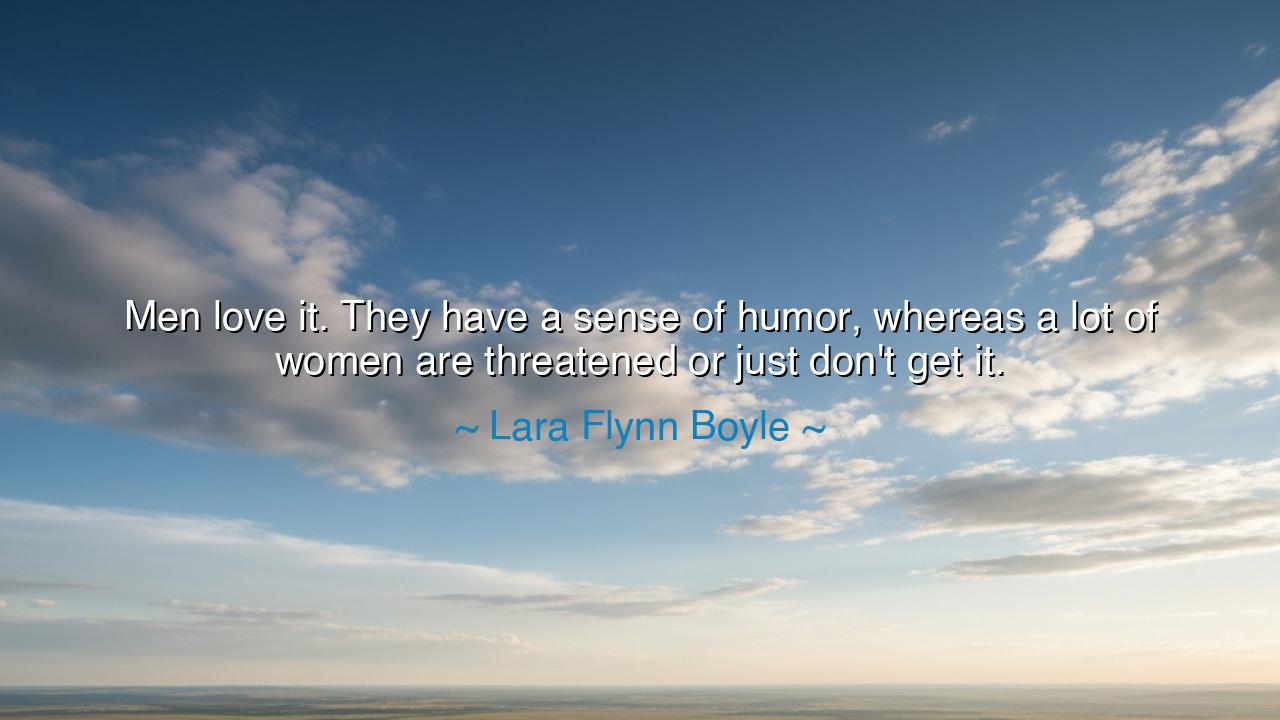
Men love it. They have a sense of humor, whereas a lot of women
Men love it. They have a sense of humor, whereas a lot of women are threatened or just don't get it.






In the words of Lara Flynn Boyle, we hear a confession both sharp and sorrowful: “Men love it. They have a sense of humor, whereas a lot of women are threatened or just don't get it.” These words, though born of a moment, speak to an ancient tension — the struggle between perception and power, between the spirit that dares to laugh freely and the one that feels judged by laughter’s sting. Her tone, half amused, half weary, reveals not malice but reflection — for humor, though light as air, has always carried the weight of truth.
Since the dawn of civilization, humor has been the trickster’s weapon — the tongue’s rebellion against convention, the mind’s defense against despair. The fools and jesters of old were not mere entertainers; they were seers cloaked in laughter, permitted to speak what others feared to utter. Men, in many ages, were taught to wield humor as a tool — to charm, to compete, to survive. Women, by contrast, were often taught to guard dignity, to maintain harmony, to silence the spark that might be misunderstood. Thus, in the reflection of Boyle’s words, we see not division by nature, but by nurture — the long echo of traditions that taught laughter to some, and silence to others.
But to say that “a lot of women are threatened” by humor is not accusation — it is observation of how deeply society’s mirrors can wound. For humor exposes vulnerability; it mocks the pretense that keeps us safe. When one has been judged, dismissed, or compared for centuries, laughter can feel like a dagger disguised as delight. To “not get it” is often not a failure of wit, but a weariness of spirit — a refusal to play in a theater where one’s voice was long forbidden.
And yet, humor is the great equalizer. It strips the powerful of pretense and lifts the weary into joy. The philosopher Voltaire once said, “God is a comedian playing to an audience too afraid to laugh.” He saw that laughter is the sign of wisdom — the proof that the soul is not enslaved by fear. When Boyle speaks of men loving her humor, she reveals how acceptance can transform laughter into communion — but how insecurity, born of judgment, can turn it into rivalry. Thus, her words invite not division but healing: a call to reclaim humor as a shared language of strength, not a weapon of difference.
Consider the tale of Hypatia of Alexandria, the philosopher who taught under the shadow of empire. Though she faced scorn and envy, she met mockery not with rage, but with grace. When a student once tried to humiliate her by questioning her virtue, she laughed, disarming him with calm and wit. Her laughter was her armor — a sign that wisdom does not flinch. Like Hypatia, Boyle’s quote reminds us that humor, when wielded by courage, can transcend insult and affirm selfhood.
A sense of humor, then, is no mere social charm; it is a sign of freedom — the soul’s refusal to bow to fear, pride, or pain. To laugh is to assert life’s absurdity and still choose joy. Those who “get it” are not those who understand every jest, but those who see that laughter, at its best, is love wearing the mask of mischief. The threatened heart, meanwhile, is the one still bound by judgment — unable to laugh because it fears being seen.
So, let this be a teaching to all who hear: do not be threatened by laughter — join it. Learn to laugh at yourself, for the one who can smile at their own folly cannot be humiliated by another. Let humor bridge, not divide; let it soften what pride has hardened. When you feel slighted, ask not, “Why do they mock me?” but “What truth might this laughter hide?” For laughter is the pulse of the human spirit — and those who share it, share in the divine.
In the end, Lara Flynn Boyle’s words remind us that the true sense of humor is not born of gender or pride, but of understanding. To laugh together is to live together — to admit that life, in all its strangeness, is best faced with grace and a smile. So cultivate humor, not as cruelty but as courage, not as sarcasm but as wisdom. For laughter, when pure, is the language of freedom — and the world, in all its heaviness, still hungers for that sound.






AAdministratorAdministrator
Welcome, honored guests. Please leave a comment, we will respond soon